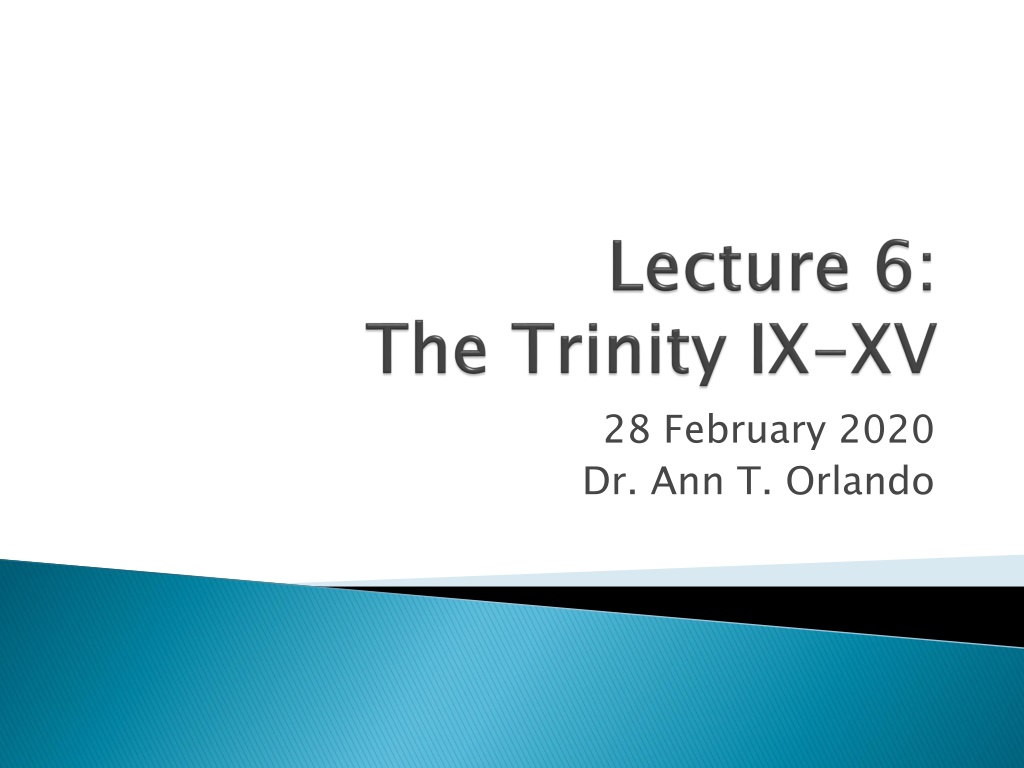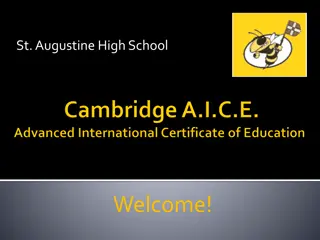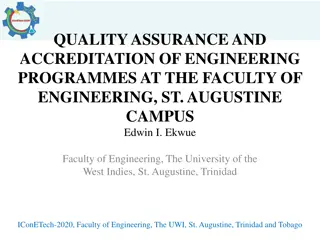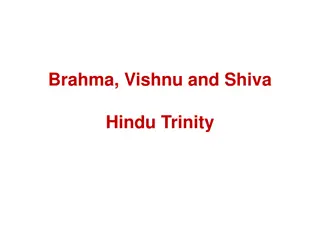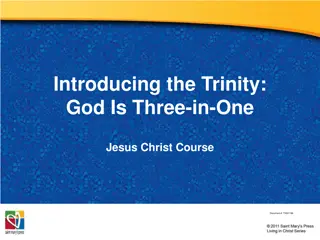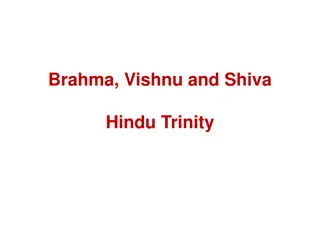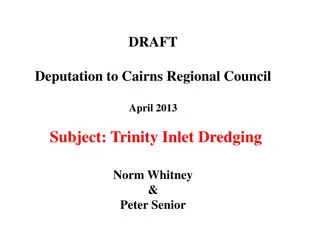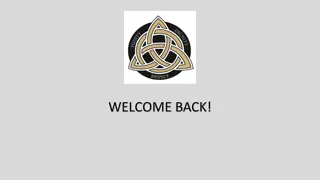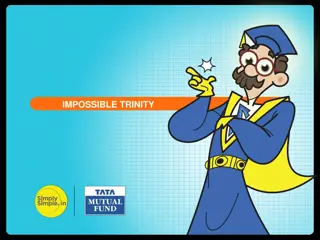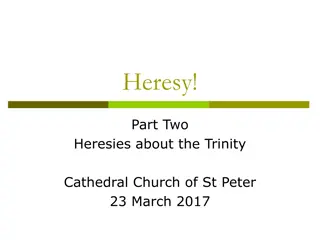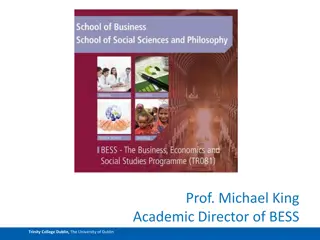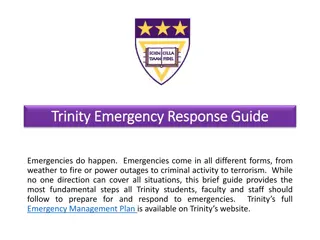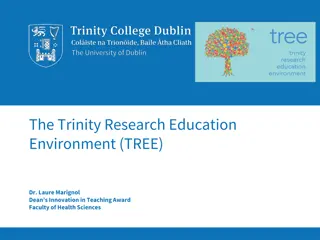Understanding De Trinitate: Augustine's Work on the Trinity
Explore the profound insights of Augustine's De Trinitate, a fundamental doctrinal statement on the Trinity in the Western Christian tradition. Delve into the relationship among the persons of the Trinity, the procession of the Spirit from the Father and the Son, and the significance of love in divine relationships. Augustine's reflections on the human mind's capacity for knowledge, memory, and will offer a glimpse into the image of God. Discover how De Trinitate weaves together theology, philosophy, and contemplation to illuminate the mysteries of faith and reason.
Download Presentation

Please find below an Image/Link to download the presentation.
The content on the website is provided AS IS for your information and personal use only. It may not be sold, licensed, or shared on other websites without obtaining consent from the author. Download presentation by click this link. If you encounter any issues during the download, it is possible that the publisher has removed the file from their server.
E N D
Presentation Transcript
28 February 2020 Dr. Ann T. Orlando
Later Books of De Trinitate At present I do not want to give my attention to the books of The Trinity, which I have had in hand for a long time and have not yet completed, for they involve much work and I think they can only be understood by a few. Letter 166.1 To Evodius , c 415 The other easier to understand works included The City of God Subsequent importance of DT Lent Sermons 207 and 215
Relationship among persons of Trinity God is Love Love implies relationship Transcendence and eminence The trinity in man Knowing, Understanding, Willing
What is relation of Spirit to Father and Son? The Spirit proceeds from the Father (II.5) The Spirit is sent into the world by and proceeds from the Son (IV.29-30) The Spirit as love and the gift of love (XV.27- 32)
Book IX: How we love Human mind knows itself, loves itself But human mind is always changing Book X: The mind knows it is incomplete Memory, understanding, will are the triad that best describe the mind (see Conf. Book X) Book XI: How sense perceptions are processed Book XII: Memory, understanding, will as the imago Dei
Book XIII: The Word of God Christ as knowledge and wisdom of God Reconsideration of the happy life: not found in this life Only possible because of redemption by Christ Book XIV: Importance of faith in this life Further thoughts on memory, intellect and will in man But because this changes, need external standards to judge truth and right conduct Book XIV: How analogy helps us to approach image of Trinity How the analogy fails See especially XIV.5.19.26 on knowledge and happiness
De Trinitate becomes the fundamental doctrinal statement on the Trinity in the West Perhaps no other work of Augustine will carry such unquestioned authority
Born in northern Italy Studied and became abbot at a Benedictine monastery in Normandy Went to (recently conquered) England in 1092 Became Archbishop of Canterbury Among his most important works: Proslogion: Ontological proofs for existence of God Cur Deus Homo: Christology of satisfaction Monologion
Written 1076, a type of soliloquy or meditation Attempt to understand the Trinity without recourse to Scripture or other authority But how does Anselm know he has gotten to the right answer? Because his answer agrees with Augustine
Whosoever will be saved, before all things it is necessary that he hold the catholic faith. Which faith unless every one do keep whole and undefiled, without doubt he shall perish everlastingly. And the catholic faith is this: that we worship one God in Trinity, and Trinity in Unity; neither confounding the Persons, nor dividing the Essence. For there is one Person of the Father; another of the Son; and another of the Holy Ghost. But the Godhead of the Father, of the Son, and of the Holy Ghost, is all one; the Glory equal, the Majesty coeternal. Such as the Father is; such is the Son; and such is the Holy Ghost. The Father uncreated; the Son uncreated; and the Holy Ghost uncreated the Son unlimited; and the Holy Ghost unlimited. The Father eternal; the Son eternal; and the Holy Ghost eternal And yet they are not three eternals; but one eternal. As also there are not three uncreated; nor three infinites, but one uncreated; and one infinite. So likewise the Father is Almighty; the Son Almighty; and the Holy Ghost Almighty. And yet they are not three Almighties; but one Almighty. So the Father is God; the Son is God; and the Holy Ghost is God. And yet they are not three Gods; but one God. So likewise the Father is Lord; the Son Lord; and the Holy Ghost Lord. And yet not three Lords; but one Lord. For like as we are compelled by the Christian verity; to acknowledge every Person by himself to be God and Lord; So are we forbidden by the catholic religion; to say, There are three Gods, or three Lords. The Father is made of none; neither created, nor begotten. The Son is of the Father alone; not made, nor created; but begotten. The Holy Ghost is of the Father and of the Son; neither made, nor created, nor begotten; but proceeding. So there is one Father, not three Fathers; one Son, not three Sons; one Holy Ghost, not three Holy Ghosts. And in this Trinity none is before, or after another; none is greater, or less than another. But the whole three Persons are coeternal, and coequal. So that in all things, as aforesaid; the Unity in Trinity, and the Trinity in Unity, is to be worshipped. He therefore that will be saved, let him thus think of the Trinity. neither confounding the Persons, nor dividing the Essence. uncreated. The Father unlimited unlimited; eternal. For like as we are compelled by the Christian verity; to acknowledge every Person by himself to be God and Lord; So are we forbidden by the catholic religion; to say, There are three Gods, or three Lords. The Holy Ghost is of the Father and of the Son; neither made, nor created, nor begotten; but proceeding.
Thinking about God in Aristotelian categories ST Ia Q39 attempts to reconcile Nicaea and Augustine with these categories Issue is relation between essence (substance) and existence (being) Aquinas thinks Augustine got this wrong See Dauphinais, Michael. Et al. Aquinas the Augustinian Washington, D.C., Catholic University Press, 2007. See Thom, Paul. The Logic of the Trinity: Augustine to Ockham. New York: Fordham University Press, 2012. At issue is substance or homoousia Augustine (like Hilary before him) shies away from substance in describing the Trinity Without qualifying discussion, same substance can sound like unitarianism and modalism Could deny separate persons (hypostases) of Trinity Dodaro, Robert. Language Matters: Augustine s Use of Literary Decorum in Theological Argument, Augustinian Studies 45:1 (2014) 1-28. Echoes of this for us: consubstantial versus one in being
Calvin cautiously accepts Nicene Creed But is concerned about non-Biblical language (homoousia) Relies on Augustine as a guide to thinking about Trinity But very cautious about analogies He rejects imago Dei as memory, intellect and will Institutes of Christian Religion I.13 and I.15
Filioque = and the Son Appears in Athanasian Creed Interpolation in the Nicene Creed in Latin Appears in West in late 7thC in some versions of Creed Accepted as standard in imperial liturgy by Charlemagne (early 9thC) Becomes a doctrinal area of contention between Europe and Byzantium as part of broader political confrontation Pope Leo III knew filioque was not a good translation from Greek Accepted as standard in Europe in 12thC Coincides with beginning of Crusades and renewed friction with Byzantium De Trinitate translated into Greek in 1274 Coincides with Byzantine request for reunification with West for defense against Turks Strongly influenced great Eastern mystic Gregory Palamas (1297-1359) Renewed friction over filioque after fall of Constantinople (1453)
The Filioque: A Church Dividing Issue? Joint USCCB and Orthodox Statement October 2003 Organization of Document I Holy Spirit in Scripture II Historical Considerations III Theological Considerations IV Recommendations Available at http://www.usccb.org/seia/filioque.shtml Pay special attention to Part III
All reformers (16th C) are Trinitarians 17thC opens up possibility of public rejection of Trinitarianism and turn to Deism Thirty Years War Scientific discoveries Return to Arianism Newton, Milton, Jefferson
Council of Nicaea made Easter fixed, although some Catholic communities continued to observe other days Thus fixing Good Friday, Holy Thursday, Ascension Thursday and Pentecost (and Sundays after Pentecost) Christmas and Epiphany set by tradition as Dec 25 and Jan 6 Each bishop specified the liturgical beginning of Lent Some feasts of martyrs universally observed: Dec 26: St. Stephen Dec 27: St. James and Decollation of John Baptist Dec 28: Feast of Holy Innocents Jun 24: Nativity of John Baptist Jun 29: Feast of Peter and Paul Aug 10: St. Laurence Aug 15: Assumption of Mary Augustine and Church in North Africa also regularly celebrated, including Jan 21: St. Agnes Mar 7: Sts. Perpetua and Felicity Sep 16: St. Cyprian Jul 17: Scillitan Martyrs NB There is no Advent for Augustine; rather the liturgical year begins with Easter Vigil
Order of readings typically followed: Old Testament Epistle Psalm Gospel However, strong evidence that during Easter season, OT is replaced by Revelation No standard lectionary By tradition, some readings were customarily used for certain feasts, but at bishop s discretion
Augustine seems to have counted Lent as 40 days before Easter Vigil, including Sundays (this changes with Pope St Gregory the Great) Lent was a time of prayer, fasting and almsgiving for entire community In solidarity with and as an example to catechumens Key Sundays in Lent First Sunday: call to Lent, readings similar to ones we now have for Ash Wednesday Fourth Sunday: Handing the Creed to the Catechumens Fifth Sunday: Giving back (reciting) the Creed; and handing the Our Father to the catechumens Sixth Sunday: Catechumens give back (recite) Our Father
Probably preached around 405 Perhaps to a wealthy congregation I shouldn t substitute lemon cake for chocolate cake and think that I am fasting Note relation between prayer, fasting and almsgiving
Preached on Fifth Sunday of Lent (maybe late 390s) Catechumens recite the Creed Another occasion for preaching on the Trinity Note reference in 5 that when catechumens first presented themselves for instruction, they received a sign of cross on foreheads Custom continued for all in later centuries on Ash Wednesday
Read De Trinitate Books IX, XIV, XV Sermons 207 and 215 Prepare paper #7
Burnell, Peter. The Augustinian Person. Washington D.C.: Catholic University Press, 2005. Dauphinais, Michael. Et al. Aquinas the Augustinian Washington, D.C., Catholic University Press, 2007. Dodaro, Robert. Language Matters: Augustine s Use of Literary Decorum in Theological Argument, Augustinian Studies 45:1 (2014) 1-28. Ayers, Lewis. Where Does the Trinity Appear? Augustine s Apologetics and Philosophical Readings of the De Trinitate, Augustinian Studies 43:1/2 (2012) 109-126. Willis, G.G. St Augustine s Lectionary. London: SPCK, 1962.
